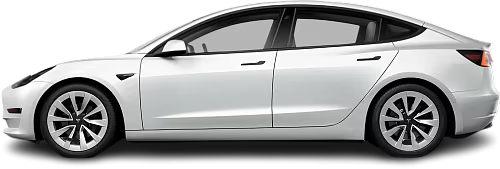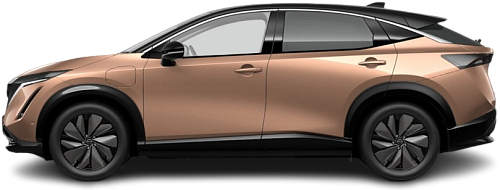Global EV Comparison: Tesla Model 3 Standard Range vs Nissan Ariya 87 kWh FWD
Struggling to Decide? Let AI Help!
Your AI Summary Is Ready!
General Info
The Nissan Ariya 87 kWh FWD (2021-…) is currently produced, it has a starting price of €53490. The Tesla Model 3 Standard Range (2019-2020) has been discontinued. You can find it for as low as €18790 on the used car market.
The Tesla Model 3 Standard Range (2019-2020) is a Sedan, whereas the Nissan Ariya 87 kWh FWD (2021-…) is a SUV.
| Property | Tesla Model 3 Standard Range | Nissan Ariya 87 kWh FWD |
|---|---|---|
| Years of Production | 2019-2020 | 2021-… |
| Current Status | Discontinued | Produced |
| Country of Manufacture | China, Germany, USA | Japan, China |
| Body Style | Sedan | SUV |
| Market Availability | EU, USA | EU, USA |
| Price Europe (New) | - Price Europe (New) | €53490 |
| Price Europe (Used) | €18790 | €39898 |
| GCC Score | 6.1 | 6.4 |
Range and Efficiency
While the Nissan Ariya 87 kWh FWD (2021-…) offers a longer real-world range and a bigger battery, it is less energy-efficient than the Tesla Model 3 Standard Range (2019-2020).
| Property | Tesla Model 3 Standard Range | Nissan Ariya 87 kWh FWD |
|---|---|---|
| Range (EPA) | 354 km | 489 km |
| Range (WLTP) | - Range (WLTP) | 536 km |
| Range (GCC) | 336 km | 462 km |
| Battery Capacity (Nominal) | 60 kWh | 91 kWh |
| Battery Capacity (Usable) | 57.5 kWh | 87 kWh |
| Efficiency per 100 km | 17.1 kWh/100 km | 18.8 kWh/100 km |
| Efficiency per kWh | 5.84 km/kWh | 5.31 km/kWh |
| Range and Efficiency Score | 6.2 | 7.3 |
Charging
Both vehicles utilize a standard 400-volt architecture.
The Tesla Model 3 Standard Range (2019-2020) offers faster charging speeds at DC stations, reaching up to 170 kW, while the Nissan Ariya 87 kWh FWD (2021-…) maxes out at 130 kW.
The Nissan Ariya 87 kWh FWD (2021-…) features a more powerful on-board charger, supporting a maximum AC charging power of 22 kW, whereas the Tesla Model 3 Standard Range (2019-2020) is limited to 11 kW.
| Property | Tesla Model 3 Standard Range | Nissan Ariya 87 kWh FWD |
|---|---|---|
| Max Charging Power (AC) | 11 kW | 22 kW |
| Max Charging Power (DC) | 170 kW | 130 kW |
| Architecture | 400 V | 400 V |
| Charge Port | CCS Type 2 (Tesla) | CCS Type 2 |
| Charging Score | 5.7 | 6.5 |
Performance
The Tesla Model 3 Standard Range (2019-2020) is rear-wheel drive, while the Nissan Ariya 87 kWh FWD (2021-…) offers a front-wheel drive system.
The Tesla Model 3 Standard Range (2019-2020) boasts greater motor power and accelerates faster from 0 to 100 km/h.
| Property | Tesla Model 3 Standard Range | Nissan Ariya 87 kWh FWD |
|---|---|---|
| Drive Type | RWD | FWD |
| Motor Type | PMSM | EESM |
| Motor Power (kW) | 208 kW | 178 kW |
| Motor Power (hp) | 279 hp | 239 hp |
| Motor Torque | 420 Nm | 300 Nm |
| 0-100 km/h | 6.1 s | 7.6 s |
| Top Speed | 225 km/h | 160 km/h |
| Performance Score | 5 | 3.5 |
Dimensions
The Tesla Model 3 Standard Range (2019-2020) has a longer body, while the Nissan Ariya 87 kWh FWD (2021-…) stands taller, offering a more elevated ride. Their widths are almost identical, so both offer a similar amount of shoulder room.
The Tesla Model 3 Standard Range (2019-2020) boasts a more extended wheelbase.
| Property | Tesla Model 3 Standard Range | Nissan Ariya 87 kWh FWD |
|---|---|---|
| Length | 4695 mm | 4595 mm |
| Width (with Mirrors) | 2088 mm | 2172 mm |
| Width (w/o Mirrors) | 1850 mm | 1850 mm |
| Height | 1445 mm | 1660 mm |
| Wheelbase | 2875 mm | 2775 mm |
Cargo and Towing
The Tesla Model 3 Standard Range (2019-2020) features a larger trunk, but the Nissan Ariya 87 kWh FWD (2021-…) offers greater maximum cargo capacity when the rear seats are folded.
A frunk (front trunk) is available in the Tesla Model 3 Standard Range (2019-2020), but the Nissan Ariya 87 kWh FWD (2021-…) doesn’t have one.
The Tesla Model 3 Standard Range (2019-2020) is better suited for heavy loads, offering a greater towing capacity than the Nissan Ariya 87 kWh FWD (2021-…).
| Property | Tesla Model 3 Standard Range | Nissan Ariya 87 kWh FWD |
|---|---|---|
| Number of Seats | 5 | 5 |
| Curb Weight | 1611 kg | 2121 kg |
| Cargo Volume (Trunk) | 561 l | 466 l |
| Cargo Volume (Max) | 1235 l | 1350 l |
| Cargo Volume (Frunk) | 88 l | - Cargo Volume (Frunk) |
| Towing Capacity | 1000 kg | 750 kg |
| Cargo and Towing Score | 5.1 | 6.8 |




